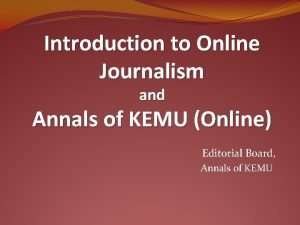Online Journalism What is online journalism The simple














- Slides: 14

Online Journalism

What is online journalism? � The simple answer is, of course, journalism as it is practiced online. �Journalism is any non-fiction or documentary narrative that reports or analyzes facts and events firmly rooted in time (either topical or historical) which are selected and arranged by reporters, writers, and editors to tell a story from a particular point of view. � Journalism has traditionally been published in print, presented on film, and broadcast on television and radio.

Media in Traditional Journalism Print(newspapers) Books Telecast Traditional Journalism Broadcast Periodicals (Magazines)

Media in Online Journalsim Print(newspapers) Telecast Books New Journalism Broadcast Internet Periodicals (Magazines)

When Started. . In 1994, Nand O Times was the first around the clock updated news & sport website, § At first, News & Observer (north Carolina’s newspaper) fed stories to the Nand O Times from the newspaper's main newsroom. § In 1995, Nand O Times and the online News & Observer became separate operations §

Characteristics of online journalism as compared to traditional journalism �Online = real time… Online journalism can be published in real time, updating breaking news and events as they happen. �Nothing new here -- we've had this ability with telegraph, teletype, radio, and TV. �Just as we gather around the TV or radio, so we can gather and attend real-time events online in chat rooms and auditorium facilities…

Online = shifted time �Online journalism also takes advantage of shifted time. �Online publications can publish and archive articles for viewing now or later, just as print, film, or broadcast publications can. �WWW articles can be infinitely easier to access, of course…

Online = multimedia �Online journalism can include multimedia elements: ▪ ▪ ▪ text and graphics (newspapers and books), plus sound, music, motion video, animation (broadcast radio, TV, film, 3 D, etc. )…

Online = interactive � Online journalism is interactive. � Traditional journalism guides the reader through a linear narrative. � The online journalist lets readers become participants, as they click their way through a hyperlinked set of pages. � Readers/participants can respond instantly to material presented by the online journalist; this response can take several forms. � Email to the reporter or editor resembles the traditional letter to editor of print publications, but email letters can be published much sooner online than in print…

Online = interactive-2 �Online journalists can also take advantage of threaded discussions that let readers respond immediately to an article, and to the comments of other readers, in a bulletin board-style discussion that can be accessed at any time. � Readers can become participants in the ongoing co-creation of an editorial environment that evolves from the online journalist's original reporting and the initial article. �Blogs (short for "Web log", a Web-based journal) make this easy.

Reliability of online information �It's a mixed bag, and should be treated the same way that professional journalists treat any other information that they find in the course of reporting a story. �Good, reliable editing and filtering of information becomes ever more important on the Web, where anybody can publish anything and make it look substantial. �Editorial "branding" becomes crucial.

The future of online journalism � Traditional news gathering organizations, publishers, and broadcasters will continue to enlarge their efforts on the Web, journalism will take advantage of higher Internet bandwidth and new technologies (streaming audio and video, etc. ) to recreate the traditional broadcast approach on the Web � Blogs have also become a popular venue for ordinary people to engage in online journalism…

The future of online journalism-2 � The Web will continue to enable publications for smaller, more specialized audiences. � The ultimate outcome of this trend will be publications for audiences of one, completely personalized according to individual preferences, served out of large editorial databases or assembled on the fly by intelligent agent software that scans the Web for news and information that meet the individual's profile of interests.

EXERCISE �Find out at least 10 the best and the worst international or local online newspaper by using any search engine and give rationale to your choice?
 Conventional journalism
Conventional journalism Literary journalism vs traditional journalism
Literary journalism vs traditional journalism Immediacy in online journalism
Immediacy in online journalism History of digital journalism
History of digital journalism Introduction to online journalism
Introduction to online journalism Hình ảnh bộ gõ cơ thể búng tay
Hình ảnh bộ gõ cơ thể búng tay Lp html
Lp html Bổ thể
Bổ thể Tỉ lệ cơ thể trẻ em
Tỉ lệ cơ thể trẻ em Gấu đi như thế nào
Gấu đi như thế nào Glasgow thang điểm
Glasgow thang điểm Alleluia hat len nguoi oi
Alleluia hat len nguoi oi Các môn thể thao bắt đầu bằng tiếng nhảy
Các môn thể thao bắt đầu bằng tiếng nhảy Thế nào là hệ số cao nhất
Thế nào là hệ số cao nhất Các châu lục và đại dương trên thế giới
Các châu lục và đại dương trên thế giới

























